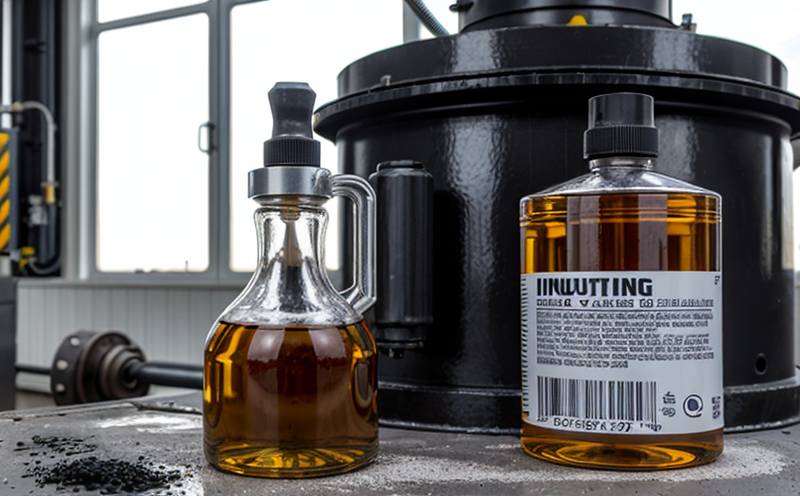ASTM D2272 Oxidation Stability Testing of Oils
The ASTM D2272 oxidation stability test is a critical procedure used in the evaluation of industrial oils and additives. This test measures how well an oil resists oxidative degradation, which is essential for ensuring its performance under operating conditions. In this context, the primary focus is on assessing the oil's resistance to forming harmful byproducts that can reduce its efficiency over time.
The ASTM D2272 method involves subjecting a sample of the industrial oil to controlled oxidation at elevated temperatures in an oxygen-rich environment. This process simulates real-world operating conditions and helps predict the service life of the oil. The test is particularly important for industries where machinery operates under high stress, such as petrochemical plants, refineries, and manufacturing facilities.
The test results provide valuable information about the thermal stability of the oil, which can influence decisions on maintenance schedules, lubricant selection, and operational efficiency. This knowledge helps ensure that the correct type and quality of oil are used in machinery, thereby minimizing downtime and maintenance costs.
Understanding the oxidation stability is crucial because it directly affects the oil's ability to protect against wear and corrosion. Oxidation can lead to the formation of sludge, varnish, and other deposits within the machinery, reducing its efficiency and potentially leading to costly repairs or replacements. By conducting ASTM D2272 tests, industries can optimize their lubricant usage and extend the life of their equipment.
The test procedure is standardized by ASTM International (formerly known as American Society for Testing and Materials). The standard specifies detailed steps for sample preparation, testing conditions, and evaluation criteria. Compliance with these standards ensures consistency and reliability in the results, which are critical for regulatory compliance and quality assurance.
| Test Parameters | Description |
|---|---|
| Oxidation Temperature | The test is conducted at 150°C ± 2.5°C to simulate real-world operating conditions. |
| Time Duration | The sample is exposed to the elevated temperature for a specified duration, typically 48 hours. |
| Oxygen Supply | A controlled supply of oxygen is maintained throughout the test to ensure consistent oxidation rates. |
The ASTM D2272 test is an integral part of quality assurance programs in many industries. It ensures that the lubricants used meet the necessary performance criteria, which are critical for maintaining efficient operation and extending the lifespan of machinery.
Eurolab Advantages
EuroLab offers comprehensive ASTM D2272 testing services with a focus on precision and reliability. Our team of experts ensures that each test adheres strictly to the ASTM standard, providing accurate results that can be trusted for decision-making.
- Highly Skilled Technicians: Our staff is trained in the latest techniques and best practices, ensuring consistent quality.
- Advanced Instrumentation: We use state-of-the-art equipment to perform the tests accurately and efficiently.
- Dedicated Reporting: Our reports are detailed and easy to understand, providing actionable insights for your business.
- Comprehensive Support: From sample preparation to report delivery, we offer full support throughout the process.
EuroLab's commitment to excellence in testing services ensures that you receive accurate, reliable results. We are dedicated to meeting the needs of our clients across various sectors, including manufacturing, petrochemicals, and refining industries.
Competitive Advantage and Market Impact
EuroLab's ASTM D2272 testing services provide a significant competitive advantage by ensuring that your industrial oils meet the highest quality standards. By maintaining consistent performance and reliability, you can enhance your reputation in the market and build trust with customers.
- Regulatory Compliance: Ensure compliance with industry regulations and standards.
- Cost Savings: Extend the life of machinery by selecting appropriate lubricants that meet stringent testing criteria.
- Enhanced Reputation: Establish yourself as a leader in quality assurance and reliability.
- Informed Decisions: Make informed choices about lubricant selection based on accurate test results.
- Customer Satisfaction: Deliver products that meet the highest standards, enhancing customer satisfaction and loyalty.
- Operational Efficiency: Minimize downtime and maintenance costs by using reliable lubricants.
EuroLab's services are designed to help you stay ahead of the competition by maintaining a high standard of quality in your industrial oils. This can lead to increased market share, improved customer retention, and overall business growth.
Use Cases and Application Examples
| Industry Sector | Application Example |
|---|---|
| Petrochemicals | Evaluating the oxidation stability of base oils for use in refining processes. |
| Manufacturing | Determining the optimal lubricant for heavy machinery to ensure minimal wear and tear. |
| Refining | Assessing the quality of lubricants used in distillation processes to enhance product purity. |
| Pipeline Operations | Testing oils for use in pipeline systems to prevent degradation that could lead to leaks. |
The ASTM D2272 test is widely used across various industries. In petrochemicals, it helps refine base oils by ensuring they meet the necessary performance criteria. For manufacturing and refining companies, this test ensures that lubricants are suitable for heavy machinery and distillation processes, respectively. Pipeline operators also benefit from this test to ensure oil quality in critical systems.





